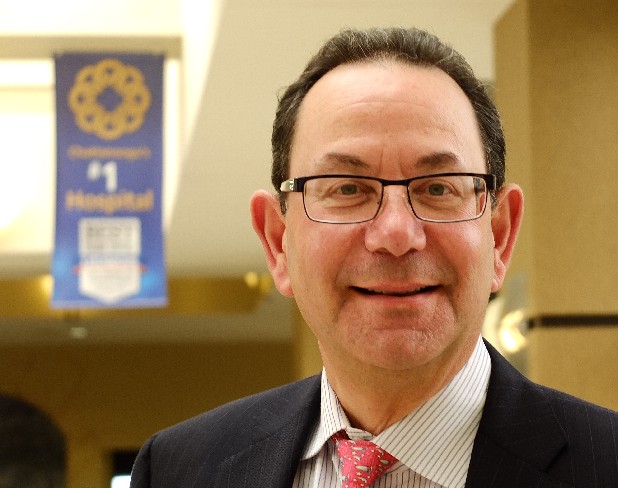Erlanger CEO eyes pension overhaul
Sunday, November 3, 2013
CURRENT PENSION PLANErlanger's current pension plan includes the following highlights: The pension is designed as retirement income for life based on pay and years an employee has worked at the hospital. The hospital pays the entire pension benefit; employees do not contribute.Average monthly compensation is determined by averaging an employee's pay over the last 10 consecutive years they have worked before they retired. If an employee has worked for fewer than 10 years, the plan will consider all their pay.Employees can retire at age 65 or as early as age 55 if the employee has at least 10 years of pension service.Source: Chattanooga-Hamilton County Hospital Authority Pension Retirement Plan & Trust Summary Plan Description, 2009
Seven months into his new role as Erlanger hospital's CEO, Kevin Spiegel is fully aware he will rock the boat as he proposes a major shift in employees' retirement plans.
But the hospital can't stay afloat without bringing its current pension system to an end, he says.
"It is unpopular," Spiegel acknowledged. "That's why it hasn't been fully dealt with. But we have to bring the hospital into line."
Spiegel said next year he is looking to "freeze" the defined benefits pension plan Erlanger has offered for decades, and shift all employees into a "modernized" retirement savings plan similar to a 401(k).
Erlanger is the Hamilton County's fourth-largest employer, with about 4,500 workers.
Over the past two years, Erlanger has put $21.5 million into its pension fund, according to an audited financial statement released this year.
Spiegel said current employees will not lose what they have so far accrued toward their pensions, but said the details of how that would be paid out have not yet been set.
The proposed changes to the hospital's pension still must be approved by the Erlanger board of trustees in coming months, and would not be implemented until July 2014.
The hospital is under intense scrutiny since violating bond covenants after running $9.5 million and $7.9 million deficits in the past two years.
Erlanger has budgeted to end this fiscal year with a $5 million loss, factoring in millions in federal budget cuts that have come with the implementation of the Affordable Care Act combined with Tennessee's failure to adopt expansion of Medicaid.
Facing these shortfalls, Erlanger has "little choice" but to impose major belt-tightening, including reining in benefits, Spiegel said.
"We can no longer afford to enrich a group of hospital employees in this way, at the expense of the hospital's fiscal viability," he said. "If I can't get this done, [the bondholders] will find someone else to do it."
Erlanger trustee Donnie Hutcherson, chairman of both the hospital's finance and personnel committees, supports the change.
"The strain that the defined benefit plan is, it's just not something that is sustainable," Hutcherson said. "Most all companies and entities have gravitated toward [plan reform] already. We're just behind the curve."
As the hospital makes the transition, Spiegel said it will look like employees have two pensions.
Though an employee's existing pension plan account will remain intact, the hospital will no longer contribute to it.
Instead, the hospital could begin to contribute about 3 percent of an employee's income toward a 403(b) plan -- which is like a 401(k) retirement plan but for employees of certain tax-exempt organizations.
Spiegel said the new system is "more secure" and the employees have "more control" over how his retirement funds are invested.
The hospital had already replaced the pension plan with the 403(b) plan for all new hires after 2009 -- but it grandfathered all employees hired before that time into the pension plan.
That wasn't a drastic enough move to curb spiraling costs, said Spiegel.
"We are not dropping below industry standards by doing this. We are lining up with them," he said.
While Erlanger granted raises to its employees this year, it also has tightened leave and extended sick day benefits. But the proposed shift in retirement benefits will be far more pivotal.
Spiegel did not have a hard estimate for how much ending the pension policy will save the hospital but said the savings will accumulate year by year.
Retirees currently drawing pension payments would not be affected, he said.
A SHIFT IN RETIREMENT PLANS
Pension plans like Erlanger's can be a big draw for employees, giving them promise of a stable income that typically allows for earlier retirement.
Defined benefit pension plans are more common for government agencies. But while Erlanger is a public hospital, "we are not funded like a government," Spiegel said.
Erlanger's move to rethink its pension policy comes as the city of Chattanooga takes a hard look at its police and firefighters pensions, which were found to be among the richest of fire and police pension plans in the Southeast.
Dr. Bruce Hutchinson, an economics professor at the University of Tennessee at Chattanooga, said there has been a pronounced shift away from defined benefit pension plans in the private sector, and a growing movement to change it in the public sector.
"Businesses in the past have underfunded those plans," Hutchinson said. "And eventually they have to start paying out those benefits."
If plans aren't adequately funded, money for pensions must come out of current revenues, putting a squeeze on the company's profits.
Life expectancies have also increased, meaning the total amount paid over time has swelled significantly.
Hutchinson said it is hard to compare the benefits for an employee of a pension plan versus a 403(b) plan, saying it all depends on how the 403(b) is invested -- and that risk is transferred to the employee.
But for a business, there is "significantly less risk" with a 403(b), Hutchinson said. A hospital contributes its percentage and doesn't have to worry about what it could owe the employee years down the road.
Still, he said, if the hospital plans to phase out the plan, it needs to abide by the employee contract and should give special consideration to employees who have retirement on the horizon and little time to invest in a new plan.
Contact staff writer Kate Harrison at kharrison@timesfreepress.com or 423-757-6673.


